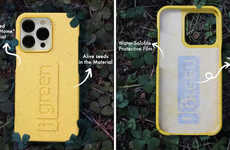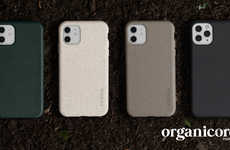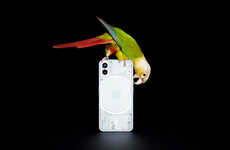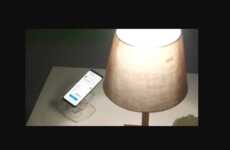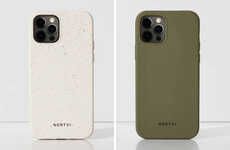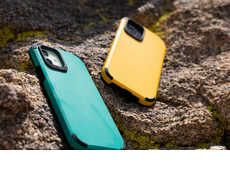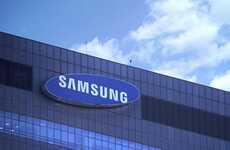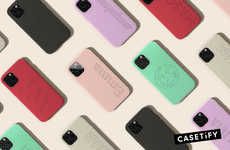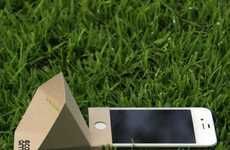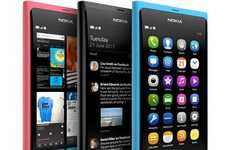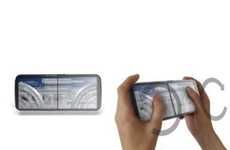
Greener Grass LINC
References: thegreenergrass.org
With new phone models and fads popping up each few months, people do not hold onto their phones as long as they used to. And let's be honest, not everyone is motivated enough to recycle their old phone. That is why this innovative plan by The Greener Grass is so impressive.
Inspired by their recent participation in the first Greener Gadgets conference, the Greener Grass has come up a very green phone concept, LINC.
LINC is essentially a touch-screen smart phone loaded with all the usual features: a cell phone, a media player, a web browser, GPS, downloadable content, Bluetooth, wifi, the latest 3G network, etc.... But here's where the familiarity ends. See, LINC is leased to the user not as a product, but as a service!
How does that work? You use the device until the next generation of hardware comes along (usually, about a year). You receive the new LINC in the mail. The two LINCs wirelessly transfer your digital information to the new set and inform you of their hardware upgrades. Then the old LINC goes through the following journey:
"LINC is to be shipped back to a regional manufacturing facility. The device contains valuable materials like aluminum, glass, and electronic components that the producer can harvest for re-use. Typically, mobile phones contain hazardous waste that goes into a landfill or are left in a desk drawer to sit in. LINC is designed for automated dis-assembly. A directed radiant heat beam targets its internal memory metal latch, releasing the assembly. In one step, LINC automatically disassembles into its few simple components, glass, aluminum and its circuit flex. The glass and aluminum, not containing any paints or adhesives, are easily recycled to pure grade materials for immediate reuse. The remaining flexible circuit contains all the electronics necessary for the entire device. It's full of hazardous materials, but it has been safely recovered for proper disposal. Many of the chip sets can easily be pulled for reuse. Components like the graphics card are out dated for LINC, but can be used in devices like portable gaming systems." (thegreenergrass.org)
Check out more green phone trends:
Inspired by their recent participation in the first Greener Gadgets conference, the Greener Grass has come up a very green phone concept, LINC.
LINC is essentially a touch-screen smart phone loaded with all the usual features: a cell phone, a media player, a web browser, GPS, downloadable content, Bluetooth, wifi, the latest 3G network, etc.... But here's where the familiarity ends. See, LINC is leased to the user not as a product, but as a service!
How does that work? You use the device until the next generation of hardware comes along (usually, about a year). You receive the new LINC in the mail. The two LINCs wirelessly transfer your digital information to the new set and inform you of their hardware upgrades. Then the old LINC goes through the following journey:
"LINC is to be shipped back to a regional manufacturing facility. The device contains valuable materials like aluminum, glass, and electronic components that the producer can harvest for re-use. Typically, mobile phones contain hazardous waste that goes into a landfill or are left in a desk drawer to sit in. LINC is designed for automated dis-assembly. A directed radiant heat beam targets its internal memory metal latch, releasing the assembly. In one step, LINC automatically disassembles into its few simple components, glass, aluminum and its circuit flex. The glass and aluminum, not containing any paints or adhesives, are easily recycled to pure grade materials for immediate reuse. The remaining flexible circuit contains all the electronics necessary for the entire device. It's full of hazardous materials, but it has been safely recovered for proper disposal. Many of the chip sets can easily be pulled for reuse. Components like the graphics card are out dated for LINC, but can be used in devices like portable gaming systems." (thegreenergrass.org)
Check out more green phone trends:
Trend Themes
1. Circular Economy Smart Phones - Opportunity for companies to implement circular economy models in the smartphone industry by leasing phones as a service and recycling valuable materials for reuse.
2. Automated Dis-assembly - Potential for innovative technology that allows for efficient disassembly of smartphones, separating valuable components for reuse and proper disposal of hazardous materials.
3. Hazardous Material Recovery - Emerging trend of recovering hazardous materials from smartphones through automated disassembly, presenting opportunities for safe and sustainable recycling practices.
Industry Implications
1. Electronics Recycling - Disruptive innovation to improve the efficiency and sustainability of electronics recycling processes.
2. Circular Economy - Opportunity for companies to transition to circular economy models in the smartphone industry, leasing devices and recycling valuable materials.
3. Waste Management - Innovative approaches in waste management for the safe and environmentally friendly disposal of smartphones, including the recovery of hazardous materials.
4.5
Score
Popularity
Activity
Freshness


